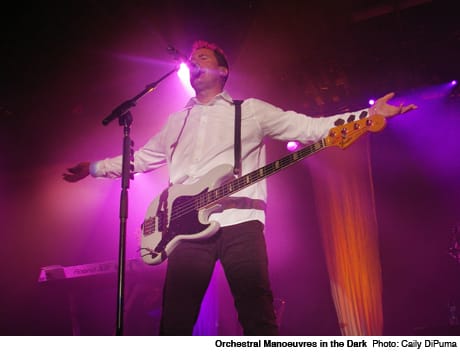Megan Washington and her benign supporting cast set the bar fairly low for Orchestral Manoeuvres in the Dark. Performing simply as Washington, Megan herself was clearly the centre of attention, looking kind of like Helena Bonham Carter in one of her crazier roles. The Aussie songwriter did a decent job as a frontperson; she had an interesting voice, her facial expressions digging into her lyrics and her hands often grasping at the unknown. But the rest of her touring band were basically dead weight, barely moving or looking in the direction of the crowd. This lack of energy did not help to sell her early '80-pop-rock-flavored compositions, problems that were compounded by her occasional mic squeals.
Whatever energy Washington's band lacked, OMD made up for in spades. Lead bassist and vocalist Andy McCluskey worked himself into a dripping sweat by the end of the first song and kept up the pace throughout, clapping and dancing like a young Bez while being worshiped like a god among men. There was a celebratory vibe in the air, like a Class of 1986 reunion. And as soon as the band took the stage after a dramatic intro and kicked into a track off 2010's History of Modern, the years melted away, and everyone was on a level playing field.
After their first track, McCluskey immediately allayed fears by saying, "Don't worry. They're not all going to be new ones." He lived up to his word, as the English quartet pulled nuggets from across their expansive catalogue. Certainly their biggest single in North America, "If You Leave" was met by the entire sell-out crowd belting out every loving word in unison.
And that is part of what set apart their work from the comparatively derivative material of Washington: the unwavering passion of OMD and their fans. The group were on the ground floor of new wave and synth pop in the late '70s, yet they play their new material with the same vigour as they would have 30 years ago, around the first time they played the Commodore. Where Washington looked back for inspiration, OMD channelled the kind of immediacy that could only come from people who know who they are, and love what they do. While their music carries a lot of nostalgia for a lot of people, OMD don't make retro music. They make modern music.
Whatever energy Washington's band lacked, OMD made up for in spades. Lead bassist and vocalist Andy McCluskey worked himself into a dripping sweat by the end of the first song and kept up the pace throughout, clapping and dancing like a young Bez while being worshiped like a god among men. There was a celebratory vibe in the air, like a Class of 1986 reunion. And as soon as the band took the stage after a dramatic intro and kicked into a track off 2010's History of Modern, the years melted away, and everyone was on a level playing field.
After their first track, McCluskey immediately allayed fears by saying, "Don't worry. They're not all going to be new ones." He lived up to his word, as the English quartet pulled nuggets from across their expansive catalogue. Certainly their biggest single in North America, "If You Leave" was met by the entire sell-out crowd belting out every loving word in unison.
And that is part of what set apart their work from the comparatively derivative material of Washington: the unwavering passion of OMD and their fans. The group were on the ground floor of new wave and synth pop in the late '70s, yet they play their new material with the same vigour as they would have 30 years ago, around the first time they played the Commodore. Where Washington looked back for inspiration, OMD channelled the kind of immediacy that could only come from people who know who they are, and love what they do. While their music carries a lot of nostalgia for a lot of people, OMD don't make retro music. They make modern music.
